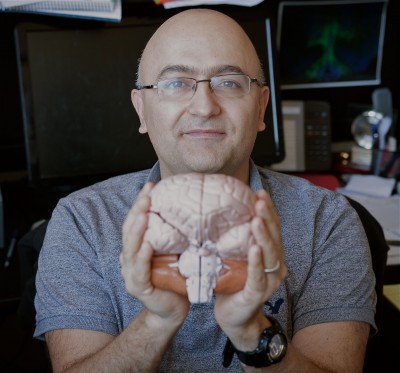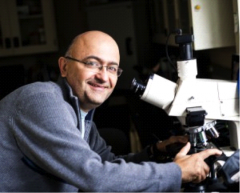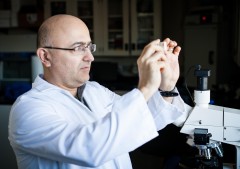 Alfonso Abizaid, Department of Neuroscience
Alfonso Abizaid, Department of Neuroscience
By Josee Beaudry
You may be that person who struggles to lose those last few pounds, or you keep gaining weight despite your best efforts, or maybe you can’t seem to keep any weight on. This is pretty normal. However, there are extreme cases; cases such as severe obesity or anorexia nervosa. These cases may be so severe that a person’s weight becomes their handicap and it is impossible to change it without some outside help. This is where Dr. Alfonso Abizaid’s research comes into play.
Dr. Abizaid is an Associate Professor at Carleton University and he looks at how the brain controls how much energy an individual needs to take in to survive and how much energy is spent on food seeking behaviors. He not only studies the processes associated with energy regulation but also looks at behavioral aspects such as how one acts when experiencing cravings or how these cravings are affected during certain stressful situations. He is particularly interested in when these regulatory processes don’t work properly and how pathological problems such as obesity or wasting diseases occur. When regulatory processes aren’t functioning normally one can have issues associated with both ends of the spectrum. For example, an individual may have energy regulatory problems that cause weight gain and severe obesity or they may experience serious metabolic or psychological disorders that lead to severe malnutrition and wasting. Dr. Abizaid’s goal is to seek treatments that may help such individuals. If it is possible to pinpoint exactly how things go wrong in energy regulation, then it may be possible to help people lose weight or gain weight depending on their case.
 One emphasis of his research has been on the hormone ghrelin, which regulates food intake and metabolism. What makes this hormone so interesting is that it is produced by the gut and makes people eat while most hormones in the gut reduce food intake. Ghrelin facilitates the accumulation of body fat and if released during a long period of time it leads to weight gain. Even more interestingly, ghrelin levels rise when an individual is stressed. Consequently, this may be the reason why people may tend to eat more and gain weight during stressful times.
One emphasis of his research has been on the hormone ghrelin, which regulates food intake and metabolism. What makes this hormone so interesting is that it is produced by the gut and makes people eat while most hormones in the gut reduce food intake. Ghrelin facilitates the accumulation of body fat and if released during a long period of time it leads to weight gain. Even more interestingly, ghrelin levels rise when an individual is stressed. Consequently, this may be the reason why people may tend to eat more and gain weight during stressful times.
Dr. Abizaid’s interest in ghrelin began while he was a postdoctoral fellow at Yale University. What really peeked his interest in ghrelin was where the hormone was acting in the brain. Of particular interest was that receptors for ghrelin were not only found in the hypothalamus- an area of the brain that works like a thermostat for energy in the brain, but also found in other areas of the brain including the ventral tegmental area (VTA). The VTA is a brain region associated with reward and addiction. That fact that ghrelin receptors were found in this area suggested that, in addition to food intake and energy regulation, this hormone could be implicated in psychological processes such as motivation, emotion and memory. Indeed, in reality we don’t just eat because we are out of energy stores. Most of the time we eat in response to signals that evoke previous pleasurable experiences with certain foods, or in response to time cues that tell us when foods are available. The fact that ghrelin targets and stimulates brain regions like the VTA also indicates that ghrelin may be a substrate for what we know as “cravings”.
 Recently, Abizaid along with his students, discovered a drug that decreases the active form of the ghrelin hormone. While this drug reduces weight gain and body fat it does not seem to cause any obvious side effects in preclinical studies. Despite this exciting discovery, they still do not know the specific mechanism in which the new drug deactivates ghrelin and for this reason they cannot test it on humans until they have a better understanding of how this drug works. Dr. Abizaid has been on the forefront of energy regulation and great discoveries lay ahead. Carleton University is lucky to have such an innovative researcher!
Recently, Abizaid along with his students, discovered a drug that decreases the active form of the ghrelin hormone. While this drug reduces weight gain and body fat it does not seem to cause any obvious side effects in preclinical studies. Despite this exciting discovery, they still do not know the specific mechanism in which the new drug deactivates ghrelin and for this reason they cannot test it on humans until they have a better understanding of how this drug works. Dr. Abizaid has been on the forefront of energy regulation and great discoveries lay ahead. Carleton University is lucky to have such an innovative researcher!